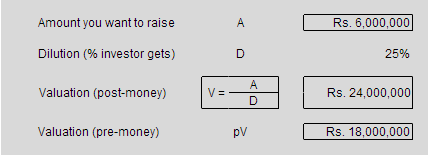The best answer to this question, as you’d probably guess is “Depends!”
The most common answer I hear is, “As much as you can” – which I’m not sure is the right answer, for at least two reasons. If you raise far more than you actually require,
- you’ll be diluting more of your company at a price lower than you need to
- you run the risk of developing a wide range of bad habits starting with mistaking raising money with running a successful business
Entrepreneurship literature suggests too much money can be as much (or greater) a cause for business failure as not enough money. Of course the same literature suggests that under-capitalization is the primary cause of slow to no growth of startups.
Better minds than mine have grappled with this issue, in a variety of manners. However most of them are set in the context of the US of A. I provide links to several at the end of this post.
Whether you raise money, in what manner and how much will depend on
Nature of business – is it a service business, that is better boot-strapped? Web design, IT services, most consulting businesses all fall into this category. Does it require significant capital expenditure or up front investment – multi-location courier service or restaurant, manufacturing or high tech businesses fall into this latter category. Of course a slew of businesses fall in between these two – which would put them in the sweet spot for formal fund raising.
Nature of capital – are only friends, family or fools going to fund your business – most businesses would fall into this category – particularly service businesses that are going to stay small or local. If you are already profitable or revenue making and are looking for capital to grow, you’re likely better off with debt. Of course in the Indian context debt may be non-trivial to access, despite a pile of money being available. Or do you need equity capital – as offered by angels or venture capitalists?
Assuming that you are a fundable business, I’d suggest asking the following three questions to determine how much money you should raise in your seed, angel or a series A round.
- How much are you likely to spend over the next 18 months for your business plan?
- Do you intend to raise another round and If so how many rounds do you anticipate?
- How much of your business will you be diluting in both the first round and subsequent rounds?
Fred Wilson’s advice to US startupsis largely applicable in the Indian context too with a couple of caveats. He advises
- raise enough for 12-18 months of business – in India I’d recommend at least 18 months
- try not to dilute more than 10-20% – in India this might have to be as high as 25% percent
Can you raise too little money? Absolutely. Two things to keep in mind are
- Things take much longer than you anticipate – the product ship, the first customer, incoming payments In India a rule of thumb would be
- It easily could take six months from the time you start your fundraising to when the money hits your bank
Good hunting!
What is the right amount of money to raise at a startup – Mark Suster
How much money to raise? – Fred Wilson
How much money should you raise from an early stage investor? – Seedcamp
How much should we raise? – Venturehacks







You must be logged in to post a comment.